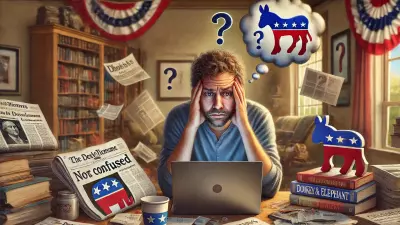Loaded and condescending as the question may seem, it’s one worth asking at a time in which many folks blindly lean into distrust and conspiracy rather than seek answers that assuage their fear and contempt for the unknown and misunderstood.

[Before we begin, let’s not get into an “America isn’t a democracy, but rather a constitutional republic” argument. America’s constitutional republic is a form of democracy. We good? Thanks.]
OK, here we go…
I’m keenly aware of the hot, stinky mess into which I stepped, asking such a loaded question because I already asked it, and some responses were less than enthusiastic, shall we say.
Those who took offense to my query perhaps thought I was looking down my journalistic nose at them while questioning America’s collective intellect when it comes to our democratic, constitutional republic.
[See what I did there? Is everyone happy? Great. Let’s move on.]
However, I have no perch from which to look down on anyone. I, too, may be among the “too dumb” to effectively participate in American democracy.
Let me explain:
Prior to starting Postindustrial in 2018, I knew staggeringly little about what was happening in my own country. Before then, I spent the vast majority of my career living in other countries and reporting on their problems.
When Trump was elected in 2016, I was in Istanbul and absolutely gobsmacked that Hillary hadn’t won.
That’s when I realized three important things:
- I didn’t know my own country, the issues concerning voters, the leaders they were electing, and the democratic process of legislation, from the federal government to the local school board.
- At no point in my education was I taught enough civics to adequately prepare me for the rigors and responsibility of being an American. Like many my age, I learned about the U.S. government via “Schoolhouse Rock” between Saturday morning episodes of “Superfriends” and “The Smurfs.”
3. That much of the legacy news media, for which I spent my entire career working – left, right, center, wherever – hadn’t done a very good job of informing folks in this era.
So I took myself to school trying to “figure out America,” a process that in part led to the creation of Postindustrial.
I learned that understanding issues like the national deficit, inflation, and, yes, tariffs requires study and that my being informed about these and other important issues (healthcare, immigration, reproductive rights, etc.) was an ongoing, neverending process.
In essence, I learned that being an informed American capable of making educated choices about the direction of my country is a tremendous responsibility that Jon Stewart explains so well:
“The work of making this world resemble one you would prefer to live in is a lunchpail fucking job,” says Stewart, and requires daily effort to be informed about the issues, aware of what our elected leaders are doing, and wary of those offering simplified solutions to complex problems.
Which brings me to America’s other dilemma: many Americans have been failed by our educational system, making it difficult for them to comprehend the complexities of the issues Americans face.
According to the National Center for Education Statistics:
Four in five U.S. adults (79%) have English literacy skills sufficient to complete tasks that require comparing and contrasting information, paraphrasing, or making low-level inferences.
The other 21% are deemed functionally illiterate, having only a basic or below basic ability to read.
This means around 43 million voting-age Americans have difficulty comprehending the basics of, say, the national economy, inflation, and, yes, tariffs.
Coupled with the vast amounts of disinformation spread by the likes of Marjorie Taylor “Jewish Space Lasers” Greene and the “news” outlets that platform them, it’s no wonder so many folks are confused.
But does this mean we are collectively too dumb to maintain a functioning democracy?
I asked three of Postindustrial’s columnists to provide their take on this loaded question and received keen insights that broadened my own understanding of the rampant expertise distrust in America.
“I think it is a bit worse than you state,” said columnist Mark Yonkman, whose writing focuses on the disconnect between rural and urban America.
“Politifact did some fact-checking on this. They found it “True” that:
- 46% of U.S. adults can’t understand labels on prescriptions.
- 63% of American 12th graders are rated “basic” or “below basic” in reading achievement (but not functionally illiterate)
- Only 37% of 12th graders reached or exceeded the academic preparedness benchmarks for both math and reading that would qualify them for entry-level college courses.
“Those 37% can have several skills for reading, “including making inferences about an author’s purpose, a character’s motivations, or a text’s mood or themes. For nonfiction works, it means having the skills to infer the meanings of unknown words by context, to be able to support opinions with text evidence, and to evaluate an author’s organization and effectiveness.”
“Do we need those for a democracy?” Yonkman asked rhetorically.
“Probably.”

Postindustrial art’s columnist Tamara White had this take on my tricky query:
“I think that a lack of education and where people are getting their information has played a big part in the election results,” said White.
“However, even individuals who are “educated” (i.e., having a higher education) are also misinformed or simply do not take the time to learn about individuals or initiatives on the ballot.
“What breaks my heart most is that it feels to me that humanity and common decency are gone. We are living in a Maury Povich world void of data, science, facts, and kindness. It baffles me how some of these extremists sleep at night.”
Me too, Tami. I can’t comprehend how anyone can live with themselves knowing they are deceiving so many people for their own self-interest.
Our healthcare columnist Mike Stancil kicked off his opinion with a lengthy excerpt from the Federalist Papers, illustrating his deep understanding of the foundation on which American democracy was constructed and a willingness to reveal just how dorky he can be while discussing democracy.
“[Alexander] Hamilton knew that strong opinions of national interest devolve into distractions from their cause,” said Stancil.
“He warns that these issues are most severe when those with power and influence are confronted with a future in which they have less power and influence.
“So, the issues we face today are just a modern version of issues that have always existed in a capitalist democracy.
“[Karl] Marx knew this after his exhaustive study of capitalism: the proletariat and the bourgeoisie are pitted against each other with conflicting interests.
“It’s not about ‘dumbness.’ It’s about being deliberately deceived at a time where deception has never been easier.”
Whew! Preach, Mike!
I feel fortunate to learn from and speak with these and other smart people at Postindustrial, who understand America far better than I and are passionate about it becoming a better place for all Americans.
They’ve helped me become a more informed, thoughtful American, who in turn is raising an eight-year-old hoping she will be as insightful and responsible an American as they are.
Now, if you’ll excuse me, I have some civics homework to do.
So do you.







